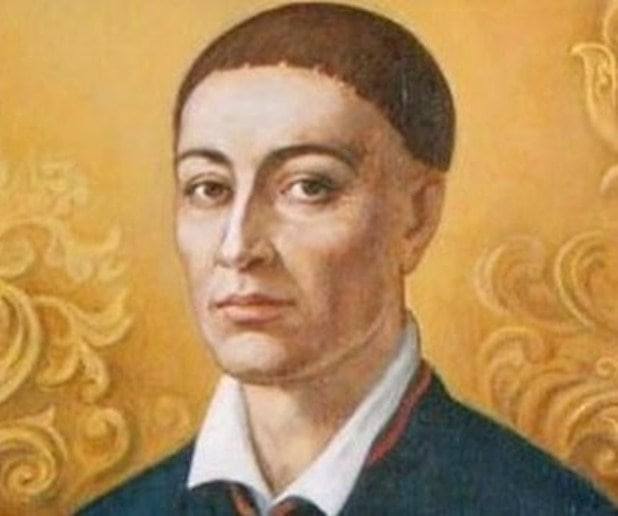HRYGORY SAVICH SKOVORODA – 300 YEARS FROM THE BIRTHDAY
December 3, 2022 marks the 300th anniversary of the birth of Hryhoriy Skovoroda, an outstanding Ukrainian philosopher, humanist educator, poet, musician, and teacher. Hryhoriy Skovoroda is one of the 100 great Ukrainians and one of the 100 symbols of Ukraine.
Hryhoriy Skovoroda was born on December 3, 1722 in the Poltava region in the Cossack village of Chornukhy, former Lubensky regiment (now Lokhvytskyi district). H. Skovoroda’s parents belonged to small-land Cossack peasants. The wonderful native landscapes, folk customs and traditions, songs and thoughts of the Lyrniks made an unforgettable impression on the future philosopher. H. Skovoroda’s childhood and youth were spent among people who did not know serf law, left a deep mark on his consciousness and influenced the formation of his freedom-loving and independent character.
He received his education at the Kyiv-Mohyla Academy, where he studied intermittently for almost 10 years (although he never finished higher education). From 1742 to 1744, as a soloist of the academic choir, he was taken to St. Petersburg to the court singing chapel, where, in addition to life experience, Hryhoriy Savych also received an additional musical education. At the end of August 1744, together with the honor of Empress Elizaveta, he arrived in Kyiv. Here he resigned from the chapel, having received the rank of “court charter member”, which meant nobility with the title “your highness”.
In 1745–1750, as a member of the “Tokai commission for procurement of wines for the royal court”, he visited Hungary, Slovakia, and Austria. After returning from abroad, Skovoroda was a teacher for almost two decades: first he taught at the Pereyaslav collegium, then he served as a governor, and finally he worked at the Kharkiv collegium. For Hryhoriy Skovoroda and his work in the Kharkiv Collegium, unfavorable circumstances developed. Misunderstandings, slander, denunciations, intrigues poisoned his life, inhibited the development of his work, and he left this job in 1764. He moved to Kyiv for a while, and then returned to Kharkiv, where he was again offered a teaching job at the collegium, and for this purpose he compiled a textbook on ethics.
In April 1769, H. Skovoroda was dismissed from work at the collegium. This was the last official place of work of the scientist-philosopher and teacher. Since then, for the last 25 years of his life, he becomes a traveling philosopher, without a permanent place of residence and without a permanent job.
The Left Bank of Ukraine, the Azov region, Voronezh region, Kursk region, Oryol region, the villages, cities and towns of these regions – the location of the “traveling university” of Ukraine, where he lived, taught, created, enjoying great popularity and favor of all strata of the population.
“Traveling Academy”, “man-university” of his era. This is about Grigory Skovoroda. In total, Hryhoriy Skovoroda wrote 17 philosophical works, 7 translations, but he did not publish a single book during his lifetime. Instead, readers sought it out themselves, read and quoted en masse, copied manuscripts, and promoted them. Taras Shevchenko himself mentioned him in his works: “I will circle the leaves and write off Skovoroda.” His most famous works are “The Garden of Divine Songs”, “Lotova’s Woman”, “Kharkov Fables”. At one time, I. Franko called H. Skovoroda a “national philosopher”, because he gave expression to deep and essential spiritual values of the nation.
H. Skovoroda died at dawn on Sunday, November 9, 1794. in the village of Ivanivka (now Skovorodinivka, Zolochiv District, Kharkiv Region) in the estate of a familiar landowner, A. Kovalevskyi. Before his death, he ordered to bury him near a grove and to make an inscription on his grave: “The world caught me, but did not catch me”, which was fulfilled.
It so happened that Kharkiv region, the homeland of G. Skovoroda, has been under fire from the enemy since the first days. Russian rockets almost completely destroyed the museum-mansion of the philosopher in Skovorodynivka, Kharkiv region, and damaged the building of the Skovoroda Pedagogical University in Kharkiv.
But it is impossible to destroy the Frying Pan. Because a little Hryhoriy Savych lives in every Ukrainian. It travels with us through borders and customs in the breast pocket, watching over our heart so that it loves and feels gratitude.
So let’s be worthy descendants of an outstanding Ukrainian!
Let’s remember that wisdom is achieved in constant work on oneself.
